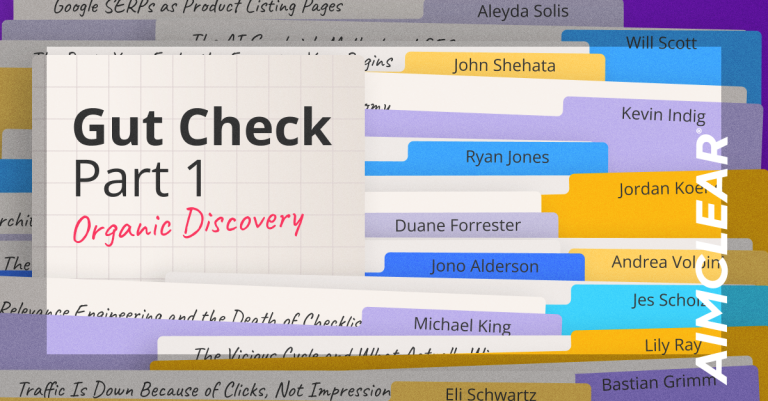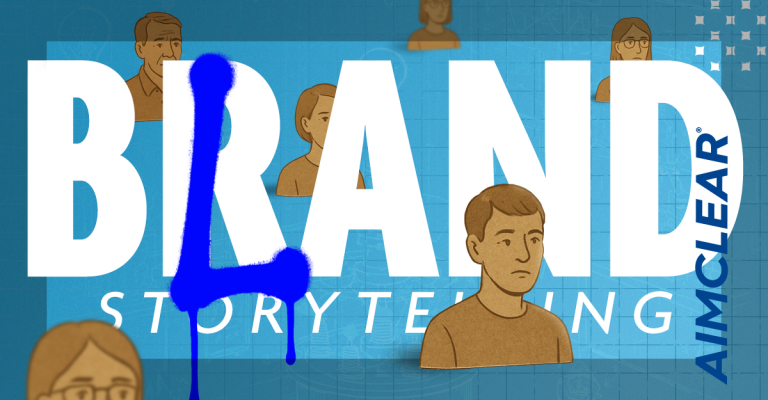As 2025 approaches, the worldwide braintrust is using AI to flip the SEO/organic-discoverability script. Let’s rip into perceptions about AI from integrated organic perspectives. No storm clouds, only real suggestions that cut through the noise of panicky SEOs. This includes Google’s mealy mouthed recommendations, previously unpublished goodies from our AIMCLEAR team, deep blog posts and videos, re: AI, business, and marketing.
Clearly coasting into 2025 isn’t an option. Thank you to our super smart friends, AIMCLEAR teammates, and others we follow- for these practical, unapologetically hacktical AI techniques and considerations. This post includes publicly shared thought leadership, including insights from nine members of the iconic SEOktoberfest fellowship.
To be clear, these citations only scratch the surface of what you can learn from each thought leader. So, we recommend following their LinkedIn profiles.
| AI Application in SEO | Description | Thought Leader | Granular Tactic |
|---|---|---|---|
| Acknowledge limitations of automated tools [Article & Video] | While artificial intelligence supports scaling content efforts, it lacks the authentic insights real experts bring. | Lily Ray, VP SEO Strategy & Search, Amsive Digital | Use unique organizational assets: Create material based on original ideas, data, and perspectives. Consider asking, “What exclusive concepts can we share?” For instance, a travel business could feature employees recounting trips, such as, “I visited this destination—these are my top five experiences.” This approach introduces authenticity that automated writing generally cannot replicate and enhances trustworthiness. |
| LLM Keyword Research [LinkedIn Thread & Video] | Research KWs, use LLMs to expand on ideas, create AI-assisted materials that serve searchers. | Rand Fishkin, Founder, Sparktoro | “I think humans should create, and AI should merely help us in the way they’re good at – tell us which words frequently come after other words. When you give an LLM good prompting and good data about an audience, it can do a pretty darn good job of giving you insight about what’s likely of interest to that audience.” |
| Utilize AI Tools to Analyze Competitor Content [Youtube Video] | Use AI tools to analyze high-ranking content and engagement trends, identifying patterns to replicate successful elements in your own material. | Cindy Krum, CEO & Founder, MobileMoxie | Benchmark Top-Ranking Pages: Use AI tools like Thruuu to identify patterns in high-ranking content, such as word count, image use, schema, or page speed. Identify Engagement Trends: Analyze what users find appealing in competitor content and replicate those qualities in your material. |
| Google AI Content Guidelines [Blog Post] | Google Search Central Blog’s most recent guidelines regarding AI-generated content, 2/8/23, | Danny Sullivan and Chris Nelson, on behalf of the Google Search Quality team | Appropriate use of AI or automation is not against our guidelines. This means that it is not used to generate content primarily to manipulate search rankings, which is against our spam policies. Automation has long been used in publishing to create useful content. AI can assist with and generate useful content in exciting new ways. Using AI doesn’t give content any special gains. It’s just content. If it is useful, helpful, original, and satisfies aspects of E-E-A-T, it might do well in Search. If it doesn’t, it might not. If you see AI as an essential way to help you produce content that is helpful and original, it might be useful to consider.If you see AI as an inexpensive, easy way to game search engine rankings, then no.
You should consider having accurate author bylines when readers would reasonably expect it, such as to any content where someone might think, “Who wrote this?” AI or automation disclosures are useful for content where someone might think “How was this created?” Consider adding these when it would be reasonably expected. Giving AI an author byline is probably not the best way to follow our recommendation to make clear to readers when AI is part of the content creation process. |
| Google’s Algorithm Hates AI Content? How To Make Google Love It [Blog Post] | The March 2024 core algorithm update was penalizing AI-generated content. Here is a better way to use AI for top ranked content., | Roger Montti, Owner – Martinibuster. | Use AI as a tool, not a replacement, Incorporate originality and insight, Emphasize authorship and credibility, Demonstrate first-hand expertise, Follow a human-led, AI-supported workflow, Avoid unoriginal or overused phrasing, Focus on E-A-T signals, Use AI for scaling, not automation, Regularly audit content for quality, Highlight unique value in the content |
| Does Google Penalize AI Content? New Data Research [Blog Post] | AI content can totally rank on Google and bring you positive results. But it’s not that simple. | Margarita Loktionova, Content Marketing Lead, Semrush | Use AI as a tool, not a replacement, Prioritize quality over quantity, Align with Google’s E-E-A-T principles, Optimize content for search intent, Leverage AI for technical optimization, Enrich AI content with human insights, Monitor and adapt to search trends, Diversify your content formats and traffic sources, Avoid low-quality, generic output, Use AI to solve specific user problems |
| AI-Assisted Value Creation [Youtube Video] | Focus on authenticity while using AI as a tool to enhance your unique voice and insights. | Purna Virji, Consultant & Program Manager, LinkedIn | AI as an enhancement, Not a replacement, Stay authentic, Value over volume, Build trust with consistency, Use AI responsibly, Engage meaningfully, Start small and improve over time, Balance AI with human insight |
| AIO SERPs Query Type Adaptation [Blog Post] | User intent, strong SEO practices, and original content creation remain critical for succeeding in AI-driven SERPs. | Kevin Indig, Growth Advisor | Optimize for organic search to increase visibility in AIOs, as even URLs outside the top 10 can appear, but those on the first page, especially positions 11-20, are more likely to be cited; tailor content formats based on query type by using lists for shopping queries, concise text for local queries, and detailed, well-structured answers for informational queries. |
| Field AI-Driven User Experiences [Unpublished, Contact] | These and other tools can help businesses create dynamic, AI-driven experiences that boost customer satisfaction, improve engagement, and drive conversions. | Marty Weintaub, Founder, AIMCLEAR | E-Commerce Personalization Tools
Customer Engagement Platforms
AI Chatbots and Virtual Assistants
Product Recommendations and Search Tools
Content Personalization Platforms
Analytics and Data Platforms
Customizable AI Agents
|
| Human-led SEO vs AI SEO on Voices of Search [Podcast] | This panel discussion focused on how generative AI is transforming SEO strategies, tools, and roles. Key insights included Google’s continued dominance in AI search, the critical role of schema markup and knowledge graphs in AI applications, and the evolution of SEO roles to include AI-driven responsibilities and experimentation | Michael King, Founder & CEO, iPullRank, Martha van Berkel, CEO & CoFounder, Schema App, Jordan Koene, Ceo & Founder, Previsible.io | Google’s Dominance in AI Search:
AI Tools and Innovations:
SEO and AI Strategy:
Schema Markup and Knowledge Graphs:
AI Integration in Workflows:
AI for Strategic Growth:
AI and the Evolution of Roles:
Data-Driven AI Tools:
Generative AI for Experimentation:
|
| Integrate Organic Messaging with Paid Campaign Data, Crunched by AI [Unpublished, Contact] | Optimize for both discoverability as indicated by paid campaign data. | Tim Halloran, Director, Ad Operations, AIMCLEAR | Daisy chain paid psychographic and search related performance (i.e. display, programmatic, social ads, Youtube ads, etc. generate successful messaging optimized for SEO, organic social, PR, and other channels. |
| The 13-point roadmap for thriving in the age of AI search [Blog Post] | Actionable insights for optimizing your digital presence across search engines, AI platforms and emerging technological ecosystems. | Jason Barnard, Brand SERP Specialist | Elevate content credibility beyond the page, rebuild digital authority, craft conversational content, adopt multi-modal content strategies, rethink visibility strategies, expand brand visibility across platforms, prioritize brand understanding and trust, refine entity optimization, revise credibility-building tactics, design content for conversational discovery, broaden SEO efforts to multi-channel search, leverage schema markup for entity optimization, adopt a holistic SEO strategy |
| Writer/Brand Voice Alignment w/ Transparent Logic [Unpublished, Contact] | Analyze brand voice for companies and individuals using greater control than AI’s black box. | Marty Weintraub, Founder, AIMCLEAR | Meld brands’ Tone, Vocabulary Complexity, Analytical Approach, Specialized Knowledge Areas, Usage of Technical Terms, Use of Acronyms, Paragraphs Structure, Sentences Length, Sentences Structure, Descriptive Detail Level, Use of Abbreviations and Acronyms, Storytelling Usage, Humor Level, Progression of Logic, Emotional Expression Level, Age Group Accessibility, Comparisons and Metaphors, Paragraphs Length, Level of Engagement with the Reader, Critique, Rules for beginning sentences, Percentage of 3 syllable words, Percentage of complex words, 4 syllables or more, Level of coherence, Idiolectal Phrases, Use of Analogies, Rhetorical Questions, Call to Action, Narrative Pace, Use of Passive vs. Active Voice, Cultural References, Intertextuality, Consistency in Point of View, Use of Imagery, Use of Questions, Conversational Markers, Subject Matter Expertise, Citation Style, Interactivity, Syntax Variation, Use of Quotations, Language Sensitivity, Branding Elements, Formatting Preferences, Burstiness. |
| SEOntology [Blog Post] | SEOntology as a framework to create standardized, interoperable SEO data, enhance AI-driven workflows, and promote human-centric AI experiences. | Andrea Volpini, CEO and Co-founder of WordLift | SEOntology is a language and collaborative framework designed to standardize and connect SEO concepts, including entities, links, queries, and semantic data, to enhance findability and alignment with AI systems.
Semantic Data and Knowledge Graphs: It emphasizes structuring data for AI applications and building Knowledge Graphs powered by SEOntology, facilitating tools like Botify, Advertools, and AI-driven agents. AI and Marketing Integration: The framework focuses on integrating AI into SEO workflows—such as internal linking and content optimization—while prioritizing a human-in-the-loop (HITL) approach to ensure ethical, context-aware, and business-relevant outcomes. Community Contribution: SEO professionals and developers are encouraged to collaborate through SEOntology’s open-source GitHub repository, fostering innovation and standardized practices across the SEO industry. The framework represents a transformative step toward aligning SEO with AI advancements, promoting responsible AI use, and empowering the SEO community with innovative tools and methodologies. |
| Local AI Search Results Near You [Blog Post] | AI-driven local search results, analyzing patterns, key insights, and optimization opportunities for businesses to enhance their visibility in AI-powered platforms. | Andrew Shotland, CEO, Local SEO Guide, SEO Consultant | Enhance readability by restructuring the content with clear subheadings, charts for data visualization, and a concise summary to make key insights more accessible. Increase engagement by including practical optimization tips for businesses, encouraging audience interaction, and adding stronger calls to action. Improve SEO by optimizing keywords, linking related content, and explaining data sources to boost credibility and drive traffic, more. |
| Building Editorial Trust Among AI: How Publishers Can Stay Ahead as Leading Voices[Blog Post] | Optimizing for AI-driven conversational tools like chatbots and voice assistants. | Valentina Izzo | Establish editorial trust, optimize content for AI discoverability, adapt to changing audience behavior, leverage AI-friendly tools, prepare for the zero-click future, build new metrics for success, align with future strategies |
| Localized Translation with Deep AI Multilingual Cultural Marketing Adaptation [Unpublished, Contact] | Move past translation to localization contingent on more than 500 cultural variables, U | Marty Weintraub | Input Any Source Language & Output in Any Other (Including Original), flag & solve for 1,000+ lingual & cultural localization variables including compliances, semantic target mapping, attainability, multilingual, multi-Stage, independent back-translations. |
| On the importance of continual evolution [Blog Post] | Adapt to change, reinvent without losing core values, embrace new technologies and tactics, reimagine offerings, turn disruption into opportunity, anchor in timeless principles. | Jono Alderson, SEO Consultant | Success in SEO and digital marketing means leveraging AI, experimenting with fresh strategies, and staying responsive to a rapidly changing universe. Like the greengrocer that transformed into an artisanal store and later a café, businesses must adapt to shifting demographics, competition, and consumer preferences. No aspect of the business should be considered untouchable. Understand user intent, solve problems, and deliver value. The fundamentals of today’s services or products might not fit tomorrow’s needs. Businesses should be willing to completely rethink and reinvent their offerings to stay relevant. By embracing change instead of resisting it, businesses can thrive in the face of disruption. Understand user needs and delivering consistent value are constants that never go out of style, provide a stable foundation for innovation and evolution. |
| SpyFu AI, Rival Flow [Tool] | Optimize Existing Content with AI. | Mike Roberts, Founder and CEO, SpyFu and RivalFlow AI | RivalFlow (Genius AI hack) spots gaps in your existing SEO content and generates high-ranking content to fill them. |
| Avoid Low-Quality AI Content [Blog Post] | Low-quality AI content can contaminate the information ecosystem, creating a “mad cow disease” effect of deteriorating reliability in search results. | Gianluca Fiorelli, International SEO Consultant | Ensure that AI-generated content is carefully reviewed and enriched with human insights to maintain quality. Reason: |
| Prepare for three key shifts in search behavior in response to the growing influence of AI on search. [Blog Post] | Conducting comprehensive SEO audits using AI for performance optimization. | Aleyda Solis, Found & Consultant, Orainti | Invest in brand recognition: Use informational resources, structured data, and community building to grow authority. Optimize product detail pages: Include detailed structured data, UGC, and high-quality images and videos. Track search features: Use pixels to monitor shifts in visibility and clicks, adapting strategies to focus on what drives results. |
| Scrape SERPs & Social, Use AI to Create Hyperbolic Headlines and Descriptions [Unpublished, Contact] | News/SERPs-jack top results and prompt to rewrite in brand voice ranging from Mad Magazine and Onion, to Bill Maher, and S&L. | Marty Weintraub | Scrape SERPs and sensationalize, ala OG vintage Digg.com. Increase organic and paid search CTR. Wins clickbait style. Particularly effective scraping Google AI SERPs and repacking with enhanced clickability. Great for social posts, video scripts, site content, H2, etc. |
| List of SEO conferences in 2025 | Count on extensive updates on AI marketing usages from conference speakers throughout 20205. | Kevin Gibbons, Founder, Re:signal | Re:Signal has updated their list of SEO/Ecommerce events and conferences to attend in 2025. |
| AI Overviews And Where Search Is Going [Blog Post & Video] | A wide range of expert opinions about AI Overviews, how they might impact the industry and where search might be going | Shelly Walsh, SEO Content Strategist |
|
So, there you go sports fans- don’t eat these all at once. Safe travels and we’ll see you in 2025. Thanks again to our starlit peeps and those we follow for sharing their expertise.









